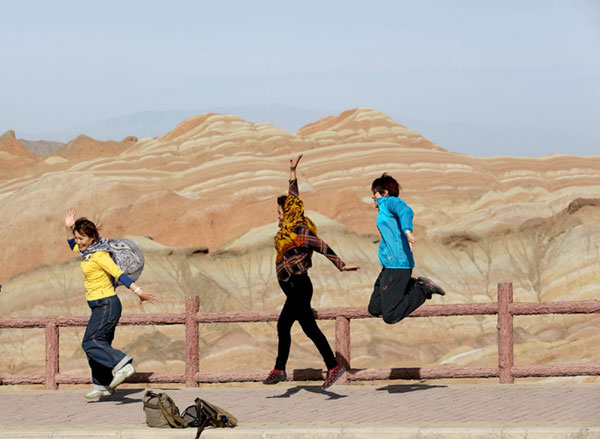Culture, tourism seen as key to developing new Silk Road
 0 Comment(s)
0 Comment(s) Print
Print E-mail China Daily, May 27, 2014
E-mail China Daily, May 27, 2014

"The Silk Road economic belt is not a China-controlled geo-economic organization," Chen said. "It is a naturally formed concept offering Central Asian nations new edges over others competing for vessel fleet size and trade volume on the international maritime trade routes."
Yang Xiuqing, a senior researcher at Dunhuang Research Academy in Gansu's Dunhuang county, another location rich in ancient Silk Road heritage, said Central Asia needs China to help it build a modern infrastructure network, and it needs to cooperate with China to develop natural resources.
"Knowing more Silk Road cultural background will give foreign visitors an impression that the modern Silk Road economic belt can not only bring goods and wealth to both sides but can also create new business opportunities and expand their market channels in China, Central Asia and Europe from a long-term perspective," Yang said.
In the meantime, businesses from Central Asian nations such as Kazakhstan, Turkmenistan and Uzbekistan have already brought products ranging from honey and lamb to cotton and tapestries to China's major western markets.
Lyu Jianzhong, chairman of the Shaanxi Folk Museums Association in Xi'an, Shaanxi province, said the Silk Road economic belt will assist China in further unleashing its economic growth potential, as regional cooperation of this kind is expected to stimulate domestic demand and prop up exports.
China is expanding economic and trade cooperation to more fields and building a new platform based on a fresh cooperative model that focuses on cultural and tourism exchanges with other nations.
Lyu organized more than 30 Chinese artists to travel along the Silk Road and visit 12 countries in 2013, including Turkey, Iran and Central Asian nations, to seek new cultural phenomena and historical inheritances from the old Silk Road.
"Local people from those destinations can definitely share Chinese artists' thought and China's rising openness and tolerance in various cultures during their communication," Lyu said. "As a result, they will be more interested in economic and cultural cooperation with China."







Go to Forum >>0 Comment(s)